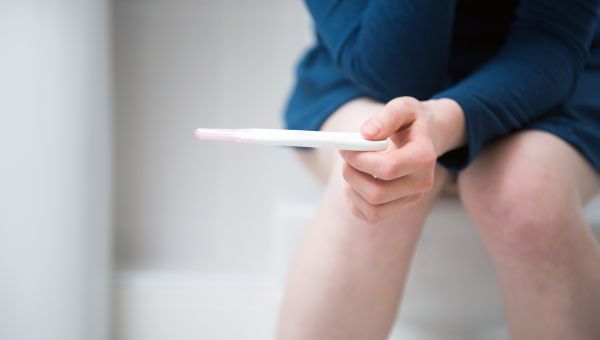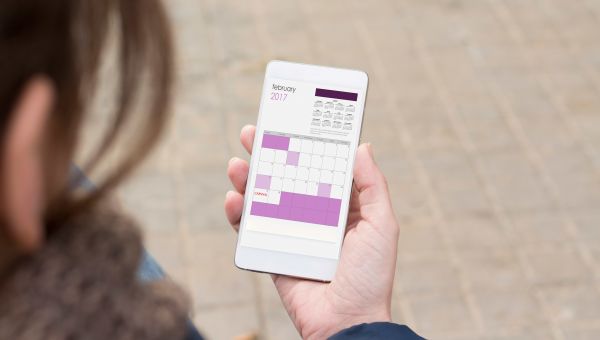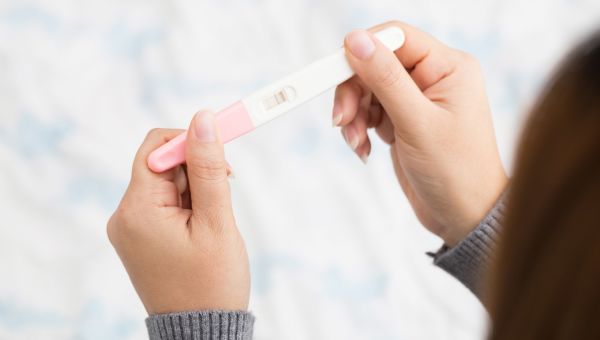9 signs of early pregnancy
What to know about the early signs of pregnancy, plus when to take a pregnancy test.
Updated on March 21, 2024

Most over-the-counter pregnancy tests are 99 percent effective when you take them after a missed period. But how do you know when to check yourself for pregnancy at home?
Pregnancy symptoms are different for everyone, and as the levels of the pregnancy hormone human chorionic gonadotropin (hCG) rise, signs of pregnancy may increase, says OBGYN Jessica Brown, MD, of Grand Strand Medical Center in Myrtle Beach, South Carolina.
Here, Brown discusses some of the first symptoms of pregnancy, along with how to ease the discomfort and the best time to take a pregnancy test.

A missed period or light bleeding
A missed period is a common sign of early pregnancy. But about one-quarter to one-third of newly pregnant people may have what’s called implantation bleeding, or bleeding that is lighter, shorter and spottier than a regular period. About 10 to 14 days after the egg becomes fertilized by the sperm, it embeds itself into the inside lining of the uterus, which may lead to implantation bleeding slightly before or around the time when you typically expect your period to start. Implantation bleeding is usually pinkish or dark brown (almost rust) in color and usually lasts from a few hours to a few days.
Brown recommends tracking your menstrual cycle, especially if you are trying to get pregnant. You can use a regular calendar, or one of many phone apps, which can help you see what a typical menstrual cycle looks like for you, including how long it is and how heavy your period is. Phone apps can also help predict your period and ovulation days for future months, says Brown. “I think this is really helpful for people who are trying to get pregnant. It can help them track when they’re most fertile.”

Tender breasts
As early as one to two weeks after egg and sperm meet and fertilization happens, breasts changes can occur. Tender, sore or enlarged breasts can be a common response to hormonal changes at the beginning of pregnancy. Nipples may also begin to change in color, usually becoming slightly darker.
Breast sensitivity should subside after a few weeks, when your body gets used to the changes in hormones. Your breasts may continue to grow and your nipples to darken as your pregnancy progresses, however. This is your body’s way of preparing for breastfeeding after birth.

Abdominal cramping
Just as cramping is common during your period, light cramping may occur during the first trimester (up to 12 to 13 weeks of pregnancy). This can happen on one or both sides of the lower abdomen, as a result of an expanding uterus and stretching ligaments; for some people it may feel like something is pulling on their sides.
A few ways to relieve cramps:
- Take a warm bath. Be careful not to take overly long or hot baths (over 98 degrees Fahrenheit), which may decrease blood flow to the fetus. The American College of Obstetricians and Gynecologists (ACOG) recommends against using hot tubs during pregnancy (especially during the first trimester), due to potential harm to the fetus.
- Place a hot water bottle wrapped in a towel on the painful area (avoid using an electric heating pad which may get too hot over time, or use one with an automatic off setting).
- Stay hydrated.
If you have severe cramping that doesn’t go away, heavy bleeding, dizziness or lower abdominal pain, or cramping on one side accompanied by bleeding, see your OBGYN so they can check you for more serious issues like an ectopic pregnancy (when a fertilized egg implants outside the uterus) or miscarriage.

Nausea and vomiting
Roughly half of all pregnant people will experience vomiting, and many more may experience some kind of nausea—especially towards the beginning of pregnancy. These issues usually start during the first two weeks to two months of pregnancy, and don’t necessarily happen in the morning. Some people will have just a few minutes of stomach upset daily, while others may have severe symptoms that last for hours each day.
Nausea and vomiting should go away as you approach the second trimester, around 13 weeks, but they may continue throughout pregnancy. These signs are not usually harmful to you or your pregnancy. However, if you can’t eat and you’re losing weight, see your OBGYN, who can assess whether you’re malnourished or dehydrated, which can affect your health and the health of your pregnancy.
Your OBGYN can also check for underlying health issues that may be causing these symptoms, such as an ulcer (sores in the stomach), food-related infection, and conditions that affect the thyroid (which can cause high or low thyroid hormone levels) or gall bladder (a small sac near the liver which stores bile, a substance that helps with digestion).
If you’re having issues with nausea, try these remedies, which may help soothe your stomach:
- Keep toast or crackers by your bed, so you can eat a snack before moving around on an empty stomach each morning.
- Stay hydrated.
- Eat smaller, more frequent meals rather than three large meals.
- The BRATT diet: bananas, rice, applesauce, toast and tea.
- Food and drinks made with real ginger, which may decrease nausea, including candies and tea.

Changes in bathroom habits
In addition to nausea and vomiting, you may experience other issues with pregnancy that affect your bathroom habits—including constipation and frequent urination.
Constipation is typically considered to be fewer than three bowel movements per week, hard, dry stool or stool that is difficult to pass. “The progesterone produced by the placenta slows the bowels down,” says Brown. Constipation can occur early in pregnancy, and can continue throughout pregnancy.
Frequent urination is also common. Symptoms can start even earlier than your missed period, when the embryo begins making the pregnancy hormone hCG and the placenta (the organ that develops during pregnancy to support and nourish the fetus) starts making progesterone, prompting you to run to the bathroom more often.
Changes in bowel habits can contribute to bloating, which can happen early and may continue throughout the nine months of pregnancy. The hormone progesterone causes your muscle tissues to relax, slowing down digestion. That, in addition to an expanding uterus, can put pressure on your bowels and contribute to bloating.
Here’s how to ease bathroom issues during pregnancy:
- Aim to get at least 25 grams of fiber a day from foods like leafy greens (like spinach and collards) and whole grains.
- Stay hydrated.
- Exercise regularly.
- Talk to your HCP about any supplements you’re taking—iron supplements, in particular, can cause constipation.
- Discuss with your OBGYN whether you should try over-the-counter medications.
- When you feel the urge, do not hold in bowel movements.
- Eat small, frequent meals. As the fetus grows, there is less space in your abdomen for your stomach and bowels to extend into after a large meal.
- Avoid foods that may cause digestive upset, gas or bloating, like beans, cabbage and fried or spicy items.

Fatigue
High levels of the hormone progesterone can cause fatigue, especially during the first trimester, when your body is generating more blood to pass along nutrients to support the pregnancy. Some people may also have low iron levels (although it’s more common in later pregnancy), contributing to fatigue.
During pregnancy, try to listen to your body, rest, and go to bed earlier than usual if you’re feeling exhausted. Eat a well-balanced diet rich in fruits, vegetables, whole grains, and lean proteins like chicken or fish, and low in salt and sugar so you’ll feel more energized. Unless your OBGYN advises against exercise, include moderate activity in your weekly routine, as you are able.

Sinus issues
“Mucus membranes swell during pregnancy, so even if you don’t have a sinus infection or allergies, it may feel that way,” says Brown. The pressure on your sinuses may cause sneezing, a sore throat, congestion, drainage or headaches.
Higher levels of the hormones estrogen and human growth hormone trigger the swelling, which can lead you to produce more mucus. The increase in blood volume and other body fluids also contributes to swollen blood vessels in your nose, causing congestion.
Some ways to minimize sinus issues during pregnancy:
- Drink plenty of fluids.
- Prop your head up on two pillows when you sleep.
- Take a warm, steamy shower or bath (avoid overly hot or long baths, and stay away from hot tubs).
- Add moisture to the air in your bedroom by using a humidifier or vaporizer if you have one
- Steer clear of things that may make symptoms worse, like smoke, alcohol, paint and chemical fumes.

Food and odor aversions or cravings
Hormonal changes during the first trimester of pregnancy can increase your sensitivity to certain smells and tastes. Alternatively, you may crave certain snacks, meals, or beverages.
When it comes to cravings or aversions, listen to your body. It’s okay to indulge in an occasional treat as long as you try to maintain a healthy intake of nutrients the rest of the day. Talk to your OBGYN or a dietitian if you’re unable to eat major food groups like vegetables or whole grains.

Mood changes
Mood changes are one of the most common early signs of pregnancy—you may find yourself exhilarated and optimistic at one moment, and completely overwhelmed the next.
Fluctuating levels of progesterone and estrogen can change the levels of your neurotransmitters—the chemicals in your brain that help control your mood. A range of emotions are typical, from feeling anxious about raising a child, excitement about being pregnant, concern about the health of your pregnancy, worried about preparations for delivery, and many other emotions.
If you’re feeling overwhelmed, try going for a walk, practicing pregnancy yoga or meditation, or napping. Setting aside time to do something enjoyable and relaxing with friends or your partner can also lower your stress and improve your mood. If you feel so overwhelmed that you can’t get out of bed or have thoughts of harming yourself or the pregnancy, call your HCP immediately to get help.

When to take a pregnancy test
It’s best to take an at-home test 5 to 10 days after a missed period for an accurate reading. If it’s negative and you don’t get your period within the next week, Brown suggests taking another test. “You may have ovulated a little later in your menstrual cycle, and because of that, your pregnancy test results or your period may be delayed a bit.”
When taking an at-home pregnancy test, follow the directions carefully, since some tests require you to wait a bit longer to confirm results, while others have slightly different instructions for urinating. Remember that the levels of the hCG pregnancy hormone in your urine are easier to detect first thing in the morning, when your urine may be more concentrated. If you test yourself later in the day, make sure you haven’t peed for at least four hours.
If you’ve taken multiple negative tests but still haven’t had your period, see your OBGYN to find out what may be causing the delay.

University of Rochester Medical Center. First Trimester Fatigue. Accessed April 28, 2023.
ACOG. Can I use a sauna or hot tub early in pregnancy. Last reviewed September 2021.
UAMS Health. Can Pregnant Women Take Baths? Last reviewed March 8, 2019.
Cleveland Clinic. Implantation Bleeding. Last reviewed December 16, 2022.
Penn Medicine Lancaster General Health. Implantation Bleeding or Your Period? How to Spot the Difference. Accessed April 27, 2023.
More On


video

article


video


video


video
